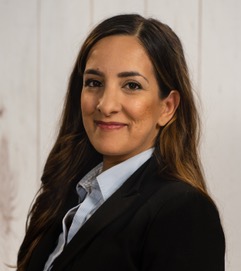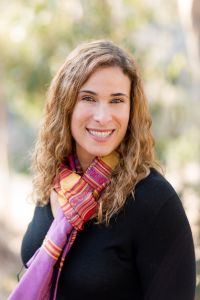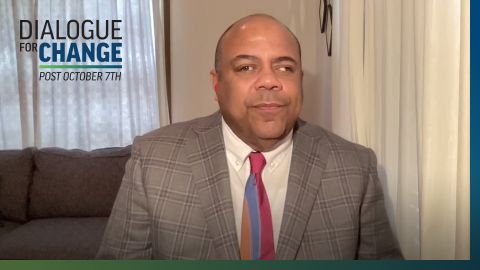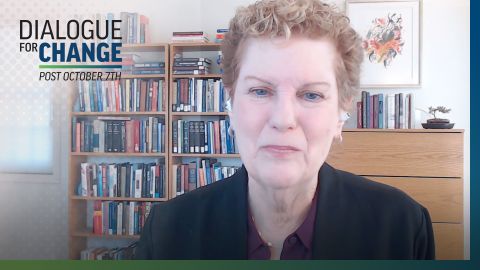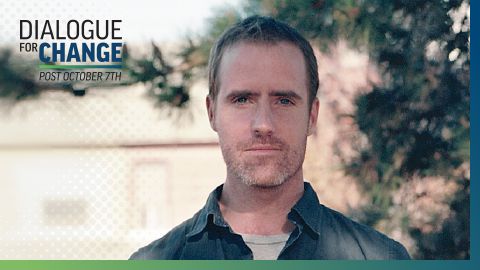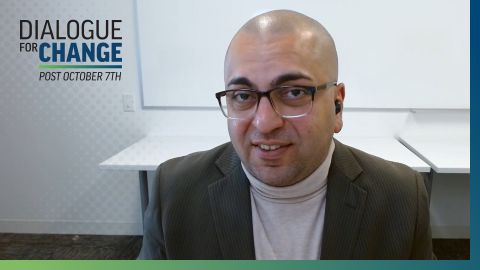Heidi Basch-Harod [00:00:01] This is nonviolent resistance. This is the real work of making the world a better place. It’s much more difficult to humanize the other than to dehumanize the other. And that is true resistance, especially in the times that we’re living in.
Hari Sreenivasan [00:00:27] Nada Higuera and Heidi Basch-Harod did not know each other before October 7th. Nada lives in Oklahoma. She’s a constitutional attorney and a first generation Palestinian American. Heidi lives in California. She’s the executive director of a nonprofit film organization called Women’s Voices Now and is Jewish American. Both are mothers of young children. Both have deep connections to the same land. And after they met, the two women also forged a deep connection with one another. We spoke with Heidi and Nada about how that happened and what they hope to accomplish through tough conversations and a growing friendship.
Hari Sreenivasan [00:01:08] Nada, you’re a Palestinian American. You call yourself a daughter of Palestine. Heidi, you are a Jewish American. You call yourself a daughter of Israel, and together the two of you are calling yourselves the daughters of Abraham. I guess what are you trying to convey by just that title itself? Heidi, let me start with you.
Heidi Basch-Harod [00:01:31] Thank you for the question, Hari. It’s so nice to be here with you and with Nada. We’re trying to convey that while the world portrays us as, fierce, immortal enemies, that we’re human beings. And at the end of the day, in order to get to the other side of this really difficult time, we need to reach out to each other and speak to each other as human beings and learn about each other.
Hari Sreenivasan [00:01:53] And is the core of this, is that you do have a shared faith in a way?
Nada Higuera [00:02:00] The core of this is that we have more in common than not. We do worship the same God, the God of Isaac, Abraham and Jacob. But we’re both mothers. We’re both, wives. We, consider ourselves sisters and, yeah, we are the same flesh and blood.
Hari Sreenivasan [00:02:21] Yeah. Nada, staying with you for a second. Tell me a little bit about your background, your family, your history.
Nada Higuera [00:02:27] Yeah. Both of my parents were born and raised in the West Bank, and they came to the States after they were married. I was born here, in America, and I am the youngest of eight daughters. My parents spoke to us in Arabic and we ate Palestinian food. Just really upheld the traditions of our culture. And, even though my parents were living here in America, in many of their ways, their mindset was still Palestinian and is still Palestinian.
Hari Sreenivasan [00:03:03] Heidi, how about you tell us a little bit about your family?
Heidi Basch-Harod [00:03:06] Sure. I come from a mixed heritage family. My mom’s side, they’re Sicilian, Catholic. My mom converted to Judaism, and my dad’s parents were Holocaust survivors. My grandmother was in Auschwitz. My grandfather was in Brooklyn Ward, and I was raised in a Jewish home. Went to Hebrew school and with, as I would say, most Jewish Americans, the experience is of learning about Israel as our homeland. And my first visit to Israel was at 11 years old. Fast forward to my mid-twenties, and I moved to Israel because I wanted to find out about the conflict for myself. And, met my husband there, and I ended up living there for five and a half years, living, studying, traveling, you know, just really. Yeah. Just really was there.
Hari Sreenivasan [00:03:47] So, Nada, like anybody else on the planet, you start seeing the images on October 7th, and then you see the images and the response from Israel. What happens to you? What what are you go through emotionally?
Nada Higuera [00:04:04] Yeah. So the, immediate news of what was happening on October 7th and the victims, obviously it devastated me for those victims. But at the same time, I really did brace myself for the response and, brace myself for an aerial bombardment. So that was, just jarring. Really jarring those first few days and, emotionally disregulating in a lot of ways of like, where do I even belong? You know, like, I am truly Palestinian, but my heart breaks for for what just happened. And that’s not resistance. That’s terrorism. But I do like, I’m, I’m pro-Palestinian through and through, and I believe in, like, the right to self-determination and freedom for Palestinians and like, having even just to reconcile. Like, can I hold both position?
Hari Sreenivasan [00:05:00] Heidi, how about you? When you saw the images from the initial attack and in the weeks and months following the images that continue to come from there? Well, what goes through your mind?
Heidi Basch-Harod [00:05:13] This is an interesting question to ask because I’ve been through this before. I lived in Israel when the first Israel-hamas War started. It was between the end of 2007, early 2008. And, it’s a horrible feeling. It’s there’s nothing but fear and everyone, it’s mutually assured destruction is basically how it feels. October 7th felt different because it wasn’t just being attacked in Israel, it was the reaction of the international community and of course, college campuses, as though as though we had done something wrong as though we deserve this and this is what was coming to us. Quite honestly, the denial of, of the of the violence that occurred on October 7th, especially against men and women of a sexual nature. I was astonished and completely shocked that, immediately, so many people that I thought we were on the same page about this idea of like, what are women’s rights? And believing all women and all the things that we’ve heard in the past few months, the, the, the mismatch of what I thought was real and what was actual was the thing that sort of, devastated me on top of all the rest of the devastation.
Hari Sreenivasan [00:06:15] How did you two meet in the first place?
Nada Higuera [00:06:19] Through a mutual friend, Shireen Tabar, who does, she does advocacy work through Empower Women Media, and she was holding these Abrahamic panels, where there were virtual meetings of women to talk about the Abraham Accords and just to come together. And Heidi was on one of those calls and, yeah, after that, we we connected separately and really just established, a friendship that’s been growing.
Hari Sreenivasan [00:06:49] So how did I mean, what made that initial spark happen?
Heidi Basch-Harod [00:06:53] I mentioned that usually I have a lot to say and, opinions on everything, but I was, so overwhelmed in a good sense, by all these women who were coming together. Not to point fingers, not to find blame, but to find how can we have community and be peaceful with one another. And that I just wanted to listen. And Nada said, how refreshing it is to hear someone who just wants to listen. And then I found out that she’s Palestinian, and I got very excited and asked Shirin, you know, do you think she would be willing to talk to me? Can I have her email? Can you get her permission? And at the same time, Nada was asking the same of Shirin. And so it just happened that we both were interested in learning more about each other and how we were both in that space together. And what let’s see what would come of it.
Hari Sreenivasan [00:07:34] Where did your conversations start? What do you remember about that first time? Nada, let me start with you.
Nada Higuera [00:07:43] I don’t necessarily remember the first conversation. What I remember is, after seeing all the images coming out of those first few weeks of October 7th, and, I also felt just like the hatred grow within me. You know, like, and having my parents, having grown up in the occupied West Bank and their only interactions with, Jewish people where the soldiers in their neighborhood. And so even just as they would growing up, as they would speak about Jews, it was the soldiers. And there wasn’t another word in Arabic. It was the Yahudi and what the Yahudi would do. And so it wasn’t until my adult life that I even realized that Yehudi isn’t a soldier. So I, I knew that that not only like, as an adult am I now like, wanting to really hate, and and not being able to separate the government of Israel, but the people of Israel and Jews in general feeling that, well, you know, and, wanting revenge and destruction also, justice and vengeance that that was like my impetus for, like, I can’t, I can’t be like that, you know, I can’t I don’t have control over much, but I have control over my own self. And if I want to see, Israelis and Jews extending kindness and humanity to Palestinians, well, like, what I can do is do that for my my fellow human beings. That is ultimately, I think, what led to me being connected with Heidi. And, I do remember just from the beginning there was an ability to be honest and to express my pain, for what Israel was doing to the Palestinians. And I do remember specifically that Heidi expressed, just sadness that the loss of Palestinian lives, the casualties and that spoke volumes. And, you know, slowly things like that would just kind of heal that, that that hard hardness that I was feeling in my heart.
Hari Sreenivasan [00:10:04] Yeah. Heidi, when you when you’re sitting down with someone and you hear that his pain and how it’s almost been baked into her and how she’s grown up and what she’s been carrying for so long on top of the immediate events that are happening on the ground, how do you not automatically get defensive? How do we begin those conversations when just that first part is so hard for people to just hear?
Heidi Basch-Harod [00:10:35] Yeah, well, this is a wonderful thing to ask and I hope that people can hear this. And like Nada mentioned, it’s it is a challenge. It is not easy to hold both truths in one place, but that’s exactly the work that we all need to do, especially people who feel so passionate and and affected by this conflict who don’t have skin in the game. I would ask that they too have the empathy and do this really hard work that she and I are doing together, because if we can do this, then really anyone can. They just have to be willing to see themselves as empathetic creatures as opposed to arbiters of justice. There’s a difference there.
Hari Sreenivasan [00:11:15] Give me an example of some of the sensitive topics that are difficult to discuss, that you have been able to talk about, knowing that what you’re about to say might anger or hurt the person that’s sitting across the table from you, even though that’s not your interest or intent.
Nada Higuera [00:11:34] I asked Heidi yesterday, does she think that what Israel is doing is collective punishment? You know, so for me, it’s like having the courage to ask that. And for Heidi, it’s having the courage to answer that honestly but respectfully. So although I can disagree with her, it helps me understand her position, particularly as a lawyer. Like I want to know. I want to know my opponent’s side and where they’re coming from and their points, which have some validity and something to back it up. I want to understand that fully, myself. Another part of our conversation that was quite impactful for me is, asking Heidi how one can criticize the actions of the right wing Israeli government. Like, how can we better do that without without being antisemitic and hateful? And what would that look like? And, and also to hear Heidi also be able to criticize the Israeli government. It gives me insight into like, how can I better express my grief and my anger? So just to be better at that, because there I think the complaints and the protest have a most of the time a valid reason, but the messaging is quite hateful and harmful.
Hari Sreenivasan [00:12:58] Heidi, what have you been surprised by that you’ve been able to discuss?
Heidi Basch-Harod [00:13:01] Oh, everything. Everything. I’ve been I’ve, you know, and, I’ve been looking for Nada for decades. Right. Like a Palestinian person who is deeply connected to her Palestinian-ness and to be able to talk about all the difficult issues, whether it’s talking about what is Hamas, you know, what is Hamas Israelis, what is Hamas to me? What are the the internal conflicts, even within Palestinian leadership? If Israel disappeared today, would Palestine be a unified, beautiful, happy country? No, it would not. And I can talk to her about those things and she can acknowledge that. And even though, you know, in a different scenario, we are enemies. And yet here we are, like tackling the things that so many people don’t seem to have, the bravery or the knowledge or the actual care to really get into. So every conversation is sort of land, you know, earth shattering in a wonderful way, in a good way.
Hari Sreenivasan [00:13:59] Is there something that has changed your perception, where your conversations sort of open the iris, if you will, to broaden your perspective on something that you hadn’t considered before? Nada, let me start with you.
Nada Higuera [00:14:16] I, speaking with Heidi, helped me to understand, the predicament that the Israeli government is in that the State of Israel is in and the need for, for it to defend itself and the complexities of urban warfare. It doesn’t change my mind that that all this violence is justified or necessary at all. And I don’t think …nobody can ever change my mind on that just because of what I’ve seen. Yeah. And the extent of the devastation. But to be able to, to not be so black and white, that has helped me expand my mind a little bit more.
Hari Sreenivasan [00:15:01] Heidi, you know, Nada was able to ask you, how could the killing of Palestinians be justified? I mean, it’s a big, heavy question. What was your response to that?
Heidi Basch-Harod [00:15:18] So I don’t like, I’m sorry, I don’t like being put in a position to justify the killing of women and children. Yeah. And it was really hard to talk about this with her. But at the end of the day, there is no doubt that my people are fighting for their survival right now. And that’s what it comes down to that at the end of the day, I have to choose my people, and we’re good people and we’re a loving people, and we are a productive people, and we deserve we deserve to live in freedom and security, just like the Palestinians do. And right now, it really has felt like an either or, not just on the battleground, but on the world stage of politics. And if I am going to truly be an advocate for her people and for my people, it can’t, my people, it can’t be at their expense. I can’t fight for Palestine and for Palestinians at the expense of my people. That’s unacceptable to me. So I have to be able to look Nada in the face and say, this is what’s happening in war. And if my people are going to come out of this, then we have to defend ourselves. And, it’s a horrible thing to have to say to someone truly.
Hari Sreenivasan [00:16:32] Nada, do you remember a difficult question Heidi asked you?
Nada Higuera [00:16:37] I remember a difficult topic. Not necessarily the question, but it was about the the young people on campuses. And why, you know, why they are so hateful. So, yeah, just being able to have that conversation and try to shed some light on, on what all these people across colleges, I mean, across the world, like why they’re feeling passionately about it. And what hopefully they think that they’re trying to accomplish. Yeah.
Heidi Basch-Harod [00:17:11] And it’s an unfinished conversation. We’re still having that one.
Nada Higuera in film clip [00:17:16] There’s room for both of us to hurt. Grief, empathy and compassion aren’t limited commodities that we have to fight over.
Hari Sreenivasan [00:17:26] So your conversations also led you to write an essay together and make a short film together. And I wonder, I guess, what led you to take those next steps from just the fact that you were speaking? Heidi?
Heidi Basch-Harod [00:17:40] It just seemed like the natural next step of our of our relationship, our conversation, and our wanting to share what’s happening between us with other people. Yeah. So, I believe what happened is, Nada is like, but I’m not a creative writer. And I’m like, well, let’s just sit down and start writing, like, let’s just see what comes out. And of course, I put it off, until the last moment. And then I sat at my computer on a rainy night in my garage, and it happened that she was on the document too, and she’s already written these beautiful things. And so my response in our essay was really it was a response to what she was writing. So it felt like one of our conversations. Yeah, but, poetic and more free because we weren’t speaking to each other and having to think about what we were saying, we were just letting it come out of us.
Hari Sreenivasan [00:18:25] Yeah, yeah. Nada, there’s a passage, in in the essay, I want to quote “Daughters of Palestine. Nobody is coming to save us, especially not the men who we allowed to lead and who contributed and continue to perpetuate this violence. Our leadership has failed.” What can women do that men don’t? And what should women do?
Nada Higuera [00:18:52] Yeah, that was part of the impetus of the writing and and what we wanted to do just, you know, having being both of us being feminist and strong women and mothers, and envisioning that future, for Palestine that I want to see. I want to see women involved in leadership. But generally within Palestinian society, women are, they are marginalized, to say the least. And I think that there is no future for Palestine if women are not at that table. And so to envision that we need we need to empower women and to to lift them up, lift their voices up and, and allow them to be to be a part of the negotiations.
Hari Sreenivasan [00:19:43] The work that you did together started October 7th. What are you two, well, let me start with you, Heidi, hoping will come from this relationship, these conversations?
Heidi Basch-Harod [00:19:56] Yes. I want a lot of things to happen. I want our film to be seen. I want our conversations to be shared so that people understand that there’s something very powerful to the art of conversation. And it’s not about knowing where you’re going, but it’s about being in the present moment so that the next step will reveal itself. And that’s I think that’s a really can maybe a woo-woo thing to say, you know, but that’s it. That’s what this takes. That’s what conflict resolution takes. It’s listening to each other. It’s being in a place of love and mutual respect. And this is just not happening, you know, anywhere in the world and especially obviously, where the war zone is happening. But we’re not in the war zone. So we can have this space and time and ability to listen and feel and and discover together.
Nada Higuera in film clip [00:20:39] Let’s have the audacity and get to work building connections. Connections that will build the free, peaceful and prosperous holy land that we want to see for both of our people. This is our resistance.
Hari Sreenivasan [00:20:56] So your film ends with the line, “this is our resistance.” Tell us kind of both for you what you mean by that sentence? Nada?
Nada Higuera [00:21:06] Yeah. For me, I mean, this is just that that Palestinian blood that roils within me that wants to do something. And that’s my resistance to to what I’m what I’m seeing to the occupation, to the war, to the violence. Yeah, this is what it looks like for me is building connections and and advocating for peace.
Hari Sreenivasan [00:21:34] How about you, Heidi?
Heidi Basch-Harod [00:21:36] I concur, this is nonviolent resistance. This is the real work of making the world a better place. It’s not about screaming slogans and showing up with mean signs and demeaning each other. This is, you know, or physically violating each other. This is the real resistance, is seeing each other as human beings. And starting from that point, it’s much more difficult to humanize the other than to dehumanize the other. And that is true resistance, especially in the times that we’re living in.
Hari Sreenivasan [00:22:05] Nada Higuera and Heidi Bash Harod, also known as the Daughters of Abraham. Thank you both for joining us.
Nada Higuera [00:22:12] Thank you. It was a pleasure.
